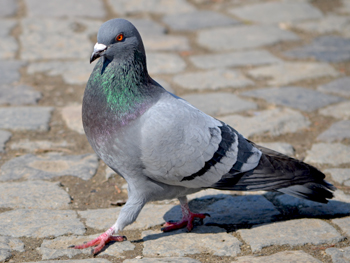New Delhi, Mar 28: A pigeon ‘detained’ with a chip on one leg, a ring with a code on the other leg and some writings on its wings near Indo-Pak coastal border in Gujarat has forced the local administration to inform the Union home ministry about its ‘mysterious’ landing.
According to two-page report sent to the home ministry, the coast guard, forest department, forensic experts and state’s Anti-Terrorism Squad have all been asked to pitch in to examine the matter.
 But since no conclusion could be drawn from the exercise, the probe into the mystery pigeon is still on, says the report.
But since no conclusion could be drawn from the exercise, the probe into the mystery pigeon is still on, says the report.
The pigeon was last in the custody of the police station at Vadinar Marine and a station diary entry was made there before taking charge of the pigeon.
The pigeon was first seen on March 20 about five nautical miles away from the shore of Salaya Essar jetty, which is under construction, in Gujarat's Devbhumi Dwarka district.
One of the security guards deployed at the jetty found that the pigeon was carrying a chip in one of its legs and a number '28733' written in a ring in the other leg. One word - 'Rasul-Ul-Allah' - was found written on the wing of the pigeon in Arabic language. The chip had 'Benjing Dual' written on it.
Coast Guard was asked to join the probe and the jetty guards handed over the pigeon to them for further investigation.
Two days later, the Coast Guard informed the local police and registered a preliminary report. The district police removed the ring and the chip from the pigeon's legs and sent the two items to the Forensic Science Laboratory in Gandhinagar for examination.
The Gujarat Forest department officials were also called up for their opinion about the pigeon which is mostly found in North India and such pigeons are used for racing purposes in foreign countries, particularly in Gulf.
The report suggests that the 'Benjing Dual' is used as a reference for pigeon race in some foreign countries.
The reports added that the pigeon might have missed out of a ship somewhere in the deep sea and in search of drinking water might have reached the shore of Salaya Essar jetty.





Comments
Thank you ffor shqring your info. I truly appreciate your efforts annd
I am waiting for your further post thank you once again.
My web pagee ... Where To Find Mens T-Shirts [shopmystore.org: http://shopmystore.org/compare-prices/query/mens-t-shirts/]
Add new comment